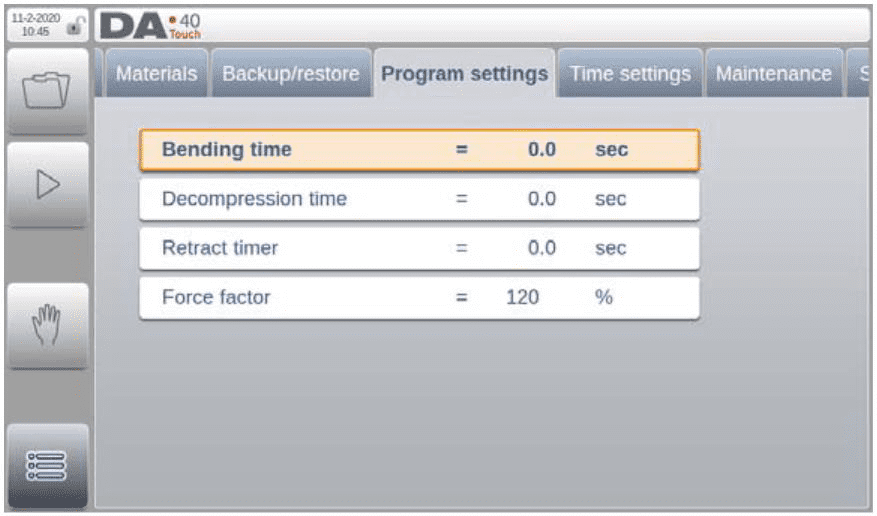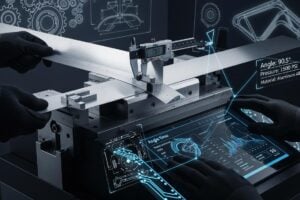Click the button to select the Part you want to view:
5.Manual mode
By tapping the navigation button Manual, thecontrol is switched to Manual mode.

In this mode one bend step can be programmed and executed.
This chapter describes all possible parameters that can beprogrammed for a bend step. Note that most of these parameters are machine configuration dependent; it might be that some of the parameters shown are not present in the userinterface.
5.1 Manual mode parameters

The position of the parameters in the Manual screen can bealtered. To change the position of a parameter, keep its tile pressed until its high-lighted and drag it to the desired position.Release the tile to fix the new position.
Material number: The material of the sheet. There are 6material types available. Material properties can be programmed in Settings mode, as described in paragraph 6.3.
![]()
Thickness: The thickness of the sheet.

Product width: This value is used for bending force calculation.

Die ID: The name (ID) of the selected die, which isused for this product.

Angle: The desired angle value. This parameter isavailable when a tool is programmed.

Angle correction: When angle programming is used, thiscorrection is used to correct Y-axis values.A positive correction means a lower beamposition.

Y-axis bend depth: When an angle is programmed, this valueis calculated. A higher value means a lowerbeam position.

Y-axis opening time: The desired opening time after a bend,programmed as a percentage of themaximum opening time.V0220, 23

Y-axis high speed: To enable high travel speed for the beamduring this bend.

X-axis position: The desired backgauge position.

X-axis retract: Backgauge retract distance.

X-axis delay time: Delay time in seconds for X-axis and FDaxis after a step change.

Bending force: The calculated bending force.

Function output: Binary value for the programmable digitaloutputs. The number of available outputsdepends on machine settings. The namealso depends on machine settings, and isFD by default.

5.2 Program execution
When all the manual mode parameters have been programmedthe single bend can be executed. To switch to execution mode,press the green start button located in the upper right corner.
To start this bend step, press ‘Start’.

To stop execution, press ‘Stop’.

When the control is started the screen will look like below:

5.3 Manual positioning
The manual positioning function of the axis in Manual mode isidentical to the manual positioning in Automatic mode, seeparagraph 4.5.
6.Settings mode
By tapping the navigation button Settings, thecontrol is switched to Settings mode.

The Settings mode of the control gives access to all kind ofsettings which influence the programming of new products andprograms.
The settings are divided across several tabs logically organizingthe different subjects. In the following sections the available tabs and detailed settings are discussed. Navigation through the tabs can be done by just tapping them and selecting the required item to adjust. Since there can be more tabs than the screen can show in one view, dragging the tabs in horizontal direction enables to view and select all available tabs.
6.1 General

Language
The user interface language can be selected from the list.There are more available languages than initially shown.Scroll vertically by dragging the list up and down to see allavailable languages. Tap to select the desired languagefor the user interface.
Inch/mm-select
Select to use either Millimeters or Inches as the unit to beused.
Ton/kN select
Select to use either Ton or kN as the main unit to be usedfor all force data.
Keyboard layout
Upon choice one can select Qwerty, Qwertz or Azertykeyboard layout. Default layout is Qwerty.
Key sound
Switch the sound function of the input panel on or off.Default sound is on.
Message sound
When the Key sound is off it is still possible to have anacoustic alert in case of a message or warning.
- All messages: acoustic alert in case of any message
- Errors + Warnings only: acoustic alert only in case of an error or warning
- Errors only: acoustic alert only incase of an error• None: No acoustic alert in case of any message
6.2 Tools
On the ‘Tools’ tab the available tools are listed; a new tool canbe created or an existing tool can be edited.

To edit an existing tool simply tab on the tool and the toolproperties window opens. Here the required changes can bemade and confirmed with the accept button.
6.2.1 New tool
To create a new tool press the ‘new die’ soft key. A new dialog is opened where the tool properties can be programmed. These values will be used for automatic bend depth calculation duringbend programming.

Die ID: A unique name or number to identify the tool. Themaximum length is 25 characters.
Width: The V-opening of the die.
Angle: The angle of the V-opening of the tool.
Radius: The radius of the edges of the V-opening.
6.2.2 Copy/rename/delete a tool from memory
Over the Edit function a selected program can be manipulated:
Copy
Create a copy of the selected tool. When making a copy the DA- 40T will prompt the keyboard for the user to provide a new name.
Rename
Change the name of the selected tool. When renaming the DA-40T will prompt the keyboard for the user to provide a new name.
Delete
Remove the selected tool from the memory. When deleting atool from memory the DA-40T will prompt a pop-up to confirmthe Delete action. This to prevent an accidental delete action.This action is permanent!
Delete all
Remove all tools from the memory. When deleting all the stored tools the DA-40T will prompt a pop-up to confirm the Delete all action. This to prevent an accidental delete all action. This actionis permanent!
6.3 Materials
On the ‘Materials’ tab, 6 different materials with their properties can be programmed.

Material name: Name of the material, as it will appear in the programmingscreens. The maximum allowed length of the materialname is 25 characters.
Tensile strength: Tensile strength of the selected material.
E module: E-module of the selected material.
6.4 Backup / restore
The ‘Backup/restore’ tab offers the possibilities to backup and restore products, tools and settings to and from a USB memory device.

When backup (restore) products, tools, settings or all is selectedfor the first time a new window with a file browser is opened. Inthis window you can browse through the directory structure ofyour backup device. Ta p the directory name on the right part ofthe file browser to look inside a subdirectory. To move one levelup, tap the name on the left part of the file browser.

Favourites -> add to favourites
With ‘add to favourites’ it is possible to mark one or more specific directories as favourite. If there are favourite directories
defined a button will be present in the upper rightcorner. By tapping this button, the defined favourites arepresented, making a quick selection of the directory possible.
Favourites -> edit favourites
In this screen the defined favourites can be given a logical name. Next time when opening the favourites by tapping the
button it will be displayed using this logical name.Favourites that are no longer needed can be deleted by tappingthe ‘delete’ soft key.
Make subdir.
Create a new subdirectory
Remove subdir.
Remove an existing subdirectory
Cancel
Exit the file browser screen
Select
Select the directory you are currently in
When the desired backup (restore) directory is selected a newwindow showing all the available products present in thememory is opened.

To backup (restore) a single product simply tap on the product tostore it on the back-up device.
To backup (restore) all products choose the ‘all’ soft key.
6.5 Program settings

Bending time
The function of this parameter is depending on themachine design. Please contact the machinedocumentation or contact the machine supplier for thefunction of this timer.
Decompression time
The function of this parameter is depending on themachine design. Please contact the machinedocumentation or contact the machine supplier for thefunction of this timer.
Retract time
The moment of X-axis retract is delayed by the valueprogrammed for this parameter.
Force factor
Percentage of calculated force which controls thepressure valve.
6.6 Time settings
In the ‘Time settings’ tab, the date and time as displayed in theupper left corner of the screen can be changed.

Display time
Display date and time, time only or no time at all on thetitle panel.
Time format
Display the time in 24 hours or 12 hours format.
Date format
Display the date in dd-mm-yyyy, mm-dd-yyyy or yyyy-mm-dd format.
Adjust time
To adjust the date and time. Adjusting the date and time will also adjust the date and time of the operating system.
6.7 Maintenance
On this tab maintenance related functions are located. Next tothe machine hour counter and the machine stroke counter alsofunctions to calibrate the backgauge and to store diagnosticdata can be found here.

Hours
The number of hours the machine is running.
Strokes
The number of strokes the pressbeam has executed.
Lock screen
To lock the screen, and e.g. clean the screen without changinganything. The screen is unlocked automatically after 5 seconds.
Create .dat-file
Tapping Create .dat-file will store the most important productand control data, by default on the connected USB stick. Thisinformation can be helpful for the maintenance support.
Calibration point
Set the Y-axis calibration point. Refer to paragraph 6.7.1 fordetails.
Restart controller
This will reboot the DA-40T system.
6.7.1 Setting the calibration point
To calibrate the bending depth calculation the calibration pointmust be programmed. This parameter defines the Y-axisposition when the tools are closed. In other words, the Y-axisposition that corresponds with the situation where the lowestpoint of the punch is at the same level as the upper side of theV-die (pinching point with sheet thickness = 0).
This procedure has to be repeated each time the height of the tools that are mounted in the machine have changed.
To set the calibration point, tap on the ‘calibration point’ soft keyon the Maintenance tab in Settings mode.
A practical way to calibrate the machine is to place a sheet ofmaterial with known thickness between the tools and find the Y-axis position at which the punch just touches the sheet (pinchingpoint) using the manual positioning function.

The first parameter indicates the Y-axis position. The second parameter is to define the thickness of the sheet that has been used for the calibration. When the thickness value is entered, the calibration point is calculated automatically.
6.8 System information
On this tab system information can be found. It shows the actualsoftware version; software update functionality is available hereas well.

With ‘update software’ the control can install a software update set from a USB stick. The directory browser will help to selectthe desired update and initiate the installation process.
Backup system
The backup system function makes a complete system backupto a USB stick. A unique time stamped file is written on the USB stick. This backup holds Delem software, OEM specific data as well as the user’s files.
Restore system
The restore system function can be used to restore an earliermade backup of the system. During the process selection of what will be restored can be done.
Offline software
The offline software function generates an offline software setup file on a USB stick. This setup can be used to update an existing offline software. Using the matching offline software version withthe control software ensures optimal compatibility of functions.
7.Diagnostics
If the service row is pressed for 2 seconds in Automatic mode orManual mode the DA-40T will enter its built-in diagnostic mode.

The diagnostic mode can be switched off by tapping the service row again.
These diagnostic screens are intended to be used onrequest of a service engineer from the machine manufacturer.
7.1 Axis state

The programmed position, actual position and control state forthe X-axis and Y-axis are displayed.
Mentioned below are the possible machine states:• S0 -> Stopped
- S1-> Positioning
- S2-> Wait for Retract
- S3 ->Wait for LDP
- • S4 -> Opening
- S5 ->Wait for STEP
- S6 -> Wait for X-delay
7.2 Inputs and outputs

The status of all inputs, outputs and encoders is displayed.
7.3 Signals

The status of all digital input and output signals is displayed.
Learn more about our products, please visit and subscribe to our Youtube channel





